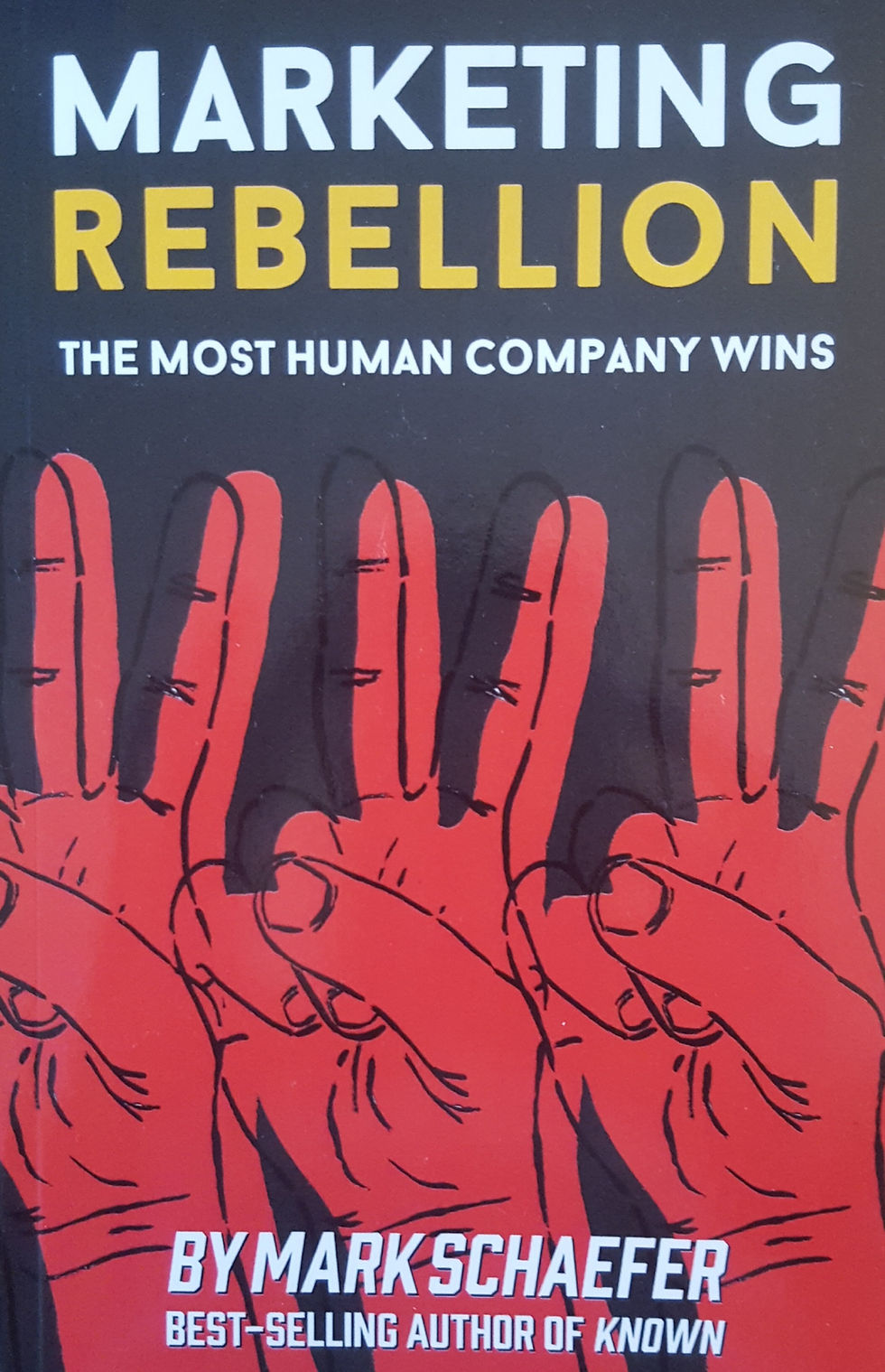Three Things I Learned from Marketing Rebellion by Mark Schaefer
- robwdiehl

- Jul 26, 2019
- 4 min read

Earlier this year, I was listening to the MarketingProfs podcast and Kerry O’Shea Gorgone was raving about Mark Schaefer’s new book, Marketing Rebellion. I had never read anything by Schaefer, and I thought this would be a great opportunity to jump in so I picked it up on Audible.
Wow, what a wake-up call for marketers!
Marketing Rebellion strives to shake up your common beliefs on how marketing should work, and offers insights on why so many companies perform poorly with their digital marketing efforts. Don’t be mistaken, this book is not just a criticism of marketers, it also provides strategies and tactics that can be used to create successful campaigns through the adoption of humanistic and values-based approaches.
In this article, I’ll summarize the three main things I learned from Marketing Rebellion.
Customer-Generated Activities
Within Marketing Rebellion, Schaefer shared some incredible insight from a study by McKinsey and Company. Their team of researchers found that “two-thirds of our marketing is being driven by customer-generated activities … the best use of technology is not to intercept or interrupt but rather to make the consumer’s path to our products fast and easy.”
What a revelation! So often we hear about marketing needing to be disruptive in order to get the customer’s attention however, more often than not, this ends up requiring the customer to take an extra unwanted step in their buyer’s journey for little to no value in return.
So, why are so many marketers still trying to control every step of the buyer’s journey? If the customer is in control of the process, we should be focused on making the purchase as easy and as enjoyable as possible. If the customer has a great experience, they are going to share that with others potential customers. Within this group are what Schaefer refers to as “true loyalists” or “Alpha Audience”; these are the happy customers who go above and beyond to talk about a brand to their network. “Take exceptional care of the 13% of your customers who are true loyalists. Give them the tools to be a referral engine for your brand. Stop bombarding consumers who don’t want a relationship with endless emails or complex loyalty programs, and lovingly reward your best customers.”
As Schaefer so eloquently points out, the “Alpha Audience” is your marketing department.
Linear Sales Funnels Are No Longer Relevant
This one may be surprising at first until you sit back and reflect on the path you took to your last major purchase. Schaefer summarizes this perfectly in the book saying, “People no longer clear a linear path from awareness to consideration to purchase. They’re narrowing and broadening their consideration set in unique and unpredictable ways.”
More and more I find myself seeking out information on purchases from a variety of sources, and placing more value on customer service and connection. Additionally, I find myself become less and less brand loyal as a result. “…only 13% of consumers are loyal to a brand, on average … a full 87% of consumers shop around.” I can’t think of many of my friends or family members that don’t fall into this “shop around” category.
With brand loyalty seemingly diminishing as consumers continue to shop around, it’s increasingly important for marketers to stay top of mind with their potential customers. To do this, Schaefer recommends creating “consumer conversations that can keep us in the consideration set.” Ask yourself what are the conversations and stories that will keep your customers thinking about you?
Humanizing Brands
For me, the largest take away from reading Marketing Rebellion was the concept that brands are humans. Today, consumers want so much more out of brands; they want brands to be something more than just a product or service. Consumers now want to engage with a brand, and they expect a brand to share their values and to be real.
To deliver this message, Shaefer added a fifth “P” to the traditional marketing matrix of product, promotion, price, and place … Purpose. Consumers choose a particular brand’s products or services based on the stories that these brands tell and the values that they stand for, in other words, their purpose.
This concept of purpose almost immediately made me flashback to Simon Sinek’s TED Talk, “Start With Why”. In this talk, Sinek repeatedly hammers home the mantra of people don’t buy what you do, they buy why you do it. His main example is Apple Computers, who he felt might have a marketing message that looks like this: “Everything we do, we believe in challenging the status quo. We believe in thinking differently. Our products are user-friendly, beautifully designed, and easy to use. We just happen to make great computers. Want to buy one?”
This mentality just feels different, and strives to attract customers who share its fundamental beliefs.
Summary
Thank you for taking the time to read this article. In summary, here are the three main things I learned from Mark Shaefer’s Marketing Rebellion.
The customer is in control. Marketers should be focused on making the purchase as easy and as enjoyable as possible so the customer becomes your marketer.
A linear sales funnel is no longer relevant as people are constantly changing their consideration set on their path to purchase.
Consumers want brands that are real and authentic beings that have a purpose.
I highly recommend Marketing Rebellion to anyone in the marketing field. This book is not only informative but it will force you to look at marketing from a completely different perspective.






Comments